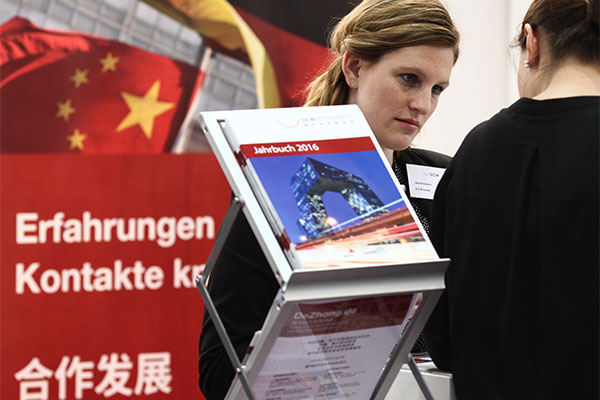
A stand of a Chinese exhibitor at the Hannover Messe 2016 in Germany.[Photo/China Daily]
Call came after Berlin withdrew its approval of takeover of chip equipment maker
The Ministry of Commerce hopes the German government’s recent investigation on a cross-border acquisition by a Chinese company is “an exception” and doesn’t represent its economic policy against Chinese businesses, said the ministry’s spokesman on Nov 2.
Shen Danyang, the spokesman, said even though Chinese investment in Germany has grown rapidly in recent years, the total volume is still relatively small. It is unnecessary for German officials to worry that German technology and jobs will be lost as a result of Chinese investment.
His comments came after Germany’s Federal Ministry for Economic Affairs and Energy withdrew its approval of Fujian-based Grand Chip Investment Fund LP’s takeover of German chip equipment maker Aixtron SE late last month, throwing up an unexpected hurdle for the 670-million-euro ($728 million) deal on the home stretch.
The German government said it had information indicating that Aixtron had technology that was relevant to security, especially to the defense sector, which could be exposed in a takeover. The deal was cleared by German government on Sept 8.
China and Germany should firmly push forward with liberalization of trade and investment, as well as oppose protectionism, Premier Li Keqiang said, according to a government statement released on Nov 2.
Premier Li made the comments on Nov 1 when he met German Economy Minister Sigmar Gabriel in Beijing.
China and the United States remained Germany’s two biggest investors in 2015, with projects numbering 260 and 252 respectively. Chinese companies mainly invested in Germany’s machinery manufacturing, electronics and semiconductor, automotive, information communications and software sectors, according to data from Germany Trade and Invest, Germany’s official investment promotion agency.
Shen called for equal treatment of Chinese companies in Germany, because it would affect Sino-German business ties.
“The future of China-Germany business ties will be decided on trade in high-end goods, and investment in infrastructure projects, high-tech manufacturing and multi-model logistics services,” said Li Guanghui, vice-president of the Chinese Academy of International Trade and Economic Cooperation in Beijing,
Li said despite both the Chinese and German economies having been affected by the global economic downturn, the degree of interdependence between the two remains stable in bilateral cross-industry investment and trade.
Chinese home appliance manufacturer Midea Group offered to take a 95 percent holding in German robotics manufacturer Kuka AG in August, and the German government said it would not block the acquisition as it would not endanger the German national security.
